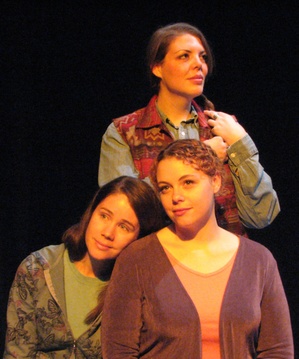EMU's 'Night Blooming' has considerable power, despite some problems

Emily Patton Levickas as Selene, Maggie Waid as Lily and Marisa Dluge as Natane in "Night Blooming"
Photo courtesy of Eastern Michigan University
Sometimes, while experiencing art, your brain does battle with itself. The analytical wing says, “I see flaws! This is problematic!” while the emotional center covers its (admittedly figurative) ears and yells, a bit too shrilly, “La la la la - don’t care! I’m feeling something!”
Such was my experience while watching EMU’s two hour production of local playwright Joe Zettelmaier’s “Night Blooming.” (The play had its world premiere at the Blackbird Theatre in 2006, but thanks to Zettelmaier’s significant revisions during the interim, one should consider EMU's production to be “Night Blooming 2.0.”)
“Blooming” tells the story of three women from different generations of a family: Natane (Marisa Dluge), a nomadic Arapaho woman who deserted her daughter shortly after she was born; Lily (Maggie Waid), Natane’s daughter, who conversely embraces motherhood at age 16 and later works toward a PhD in botany; and Selene (Emily Patton Levickas), the daughter whose health crisis forces her mother and estranged grandmother to confront their painful past.
The play’s opening scene, which features Lily and Selene chatting outside one night, suffers a bit from “Gilmore Girls” syndrome - which is to say, the wise-cracking, angelic teenager and her mom seem a tad too easy and chummy with each other to be believed, and their banter feels more written and “cute” than it does real. Yes, the dynamic of a young mom who’s not so far in age from her daughter would surely close some of the usual gaps between parent and child, but the depiction still gave me pause.
Some of director Terry Heck’s staging choices did as well. Early in the play, Dluge and Waid speak to each other by phone at opposite ends of the stage, but during the course of the conversation, their hands drop, they come together in a kind of brief, fantastical dance, and then they return to their spaces, with the phones back at their ears. Poetic, perhaps, but too self-consciously so.
John Charles’ tri-level set, meanwhile, is deliberately sparse, which is fine; but when a play jumps around in time and space as much as “Blooming” does, it’s sometimes hard to know precisely where we are. For instance, the same door leads to both the interior and the porch of Lily and Selene’s house; Natane’s in a hospital bed at one point, but because Lily initially addresses her from her house’s living room, you think Natane is instead resting at Lily’s house; and Lily continues to move all around the large stage while talking with hospitalized Natane, though the showdown between these two would probably be better served within the claustrophobic parameters of a recovery room.
More generally, the play’s many leaps in space and time can make for a sometimes-bumpy ride - you may find yourself, like I did, reflexively guessing and calculating ages in each scene until a hint comes your way - and Lily’s too-easily-disposed-of father, as well as Natane’s excuses for abandoning Lily, feel like narrative shortcuts.
Yet despite the qualms that gnawed away at me throughout opening night's performance, I nonetheless found myself quite moved by play’s end, thus indicating that despite its problems, “Blooming” has enough good, engaging writing to make it work on an emotional level.
My reaction wasn't solely the result of the play's strongest writing moments, however. Heck also guides her three-woman cast well, in terms of acting, and each one gets a few moments to shine. Levickas handles the task of being a young teen who’s forced to grow up fast, due to her illness, with energy and charm; Waid powerfully conveys the pain of being an abandoned child, as well as that of a mother who’s desperate to save her child; and Dluge somehow manages to reconcile Natane’s maddening remove with her exotic appeal.
So while I wasn’t audibly sniffling during “Blooming”’s final scene (as many patrons were on opening night), I did end up feeling as though the show’s emotional power makes it relatively easy to forgive its trespasses.
After all, it’s a rare play that inspires me to go home and watch my two year old daughter sleep for a few minutes before writing the review.
Jenn McKee is the entertainment digital journalist for AnnArbor.com. Reach her at jennmckee@annarbor.com or 734-623-2546, and follow her on Twitter @jennmckee.


Comments
Faroh
Mon, Jan 24, 2011 : 8:15 p.m.
Make up your mind...what is the last name of the actress who played Selene - Levickas, Levicky, or Patton (in the photo caption)?
Bob Needham
Mon, Jan 24, 2011 : 8:51 p.m.
Thanks, we corrected that.